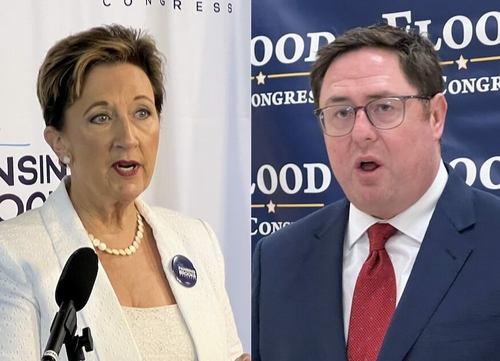Fortenberry and Sasse headline unusual year-end campaign finance reports

OMAHA — The departures of a congressman and a U.S. senator spiced up the final campaign finance reports for Nebraska’s congressional races in 2022.

In eastern Nebraska’s 1st Congressional District, U.S. Rep. Mike Flood, R-Neb., defeated Democratic State Sen. Patty Pansing Brooks in a rare special election.
The seat opened when Rep. Jeff Fortenberry resigned after being convicted of three federal felonies, related to illegal foreign campaign funds raised for one of his previous bids.
Flood, who challenged Fortenberry in the Republican primary, raised $2.2 million and spent $2.1 million in the primary, special and general elections combined. Pansing Brooks raised and spent $1.8 million over the same span.
Fortenberry who is appealing his convictions, paid $783,000 in legal fees from his House campaign account in 2021 and 2022.
He folded up his federal campaign committee in October, having spent $1.68 million in his final two years, primarily on legal fees, campaign consultants and advertising.
Political observers have speculated that Fortenberry might run again for his old seat if he is successful on appeal.

In the Omaha-based 2nd District, Nebraska’s most competitive, Rep. Don Bacon, R-Neb., outraised his Democratic opponent, State Sen. Tony Vargas.
Bacon raised and spent about $4 million. Vargas raised and spent $3.4 million, the second highest of any Democratic candidate in the district over the years. He trailed only Kara Eastman, who raised and spent $4.5 million in 2020.
But like Eastman, Vargas faced an onslaught of outside spending, $5.2 million, according to OpenSecrets.org, which tracks congressional campaign spending by race.
Outside groups spent $3.5 million against Bacon.
Bacon also benefited from outside groups spending $2.1 million to support him. By contrast, outside groups spent $101,872 backing Vargas.
Rep. Adrian Smith, who serves Nebraska’s largely rural 3rd District, raised $1.7 million and spent $1.9 million – most of that in supporting other House Republicans. He spent about $70,000 on his own race, most of that for political and fundraising consultants.
His challenger, Democrat David Else of Overton, didn’t raise or spend the $5,000 minimum that triggers the obligation to file a report.

U.S. Sen. Ben Sasse, R-Neb., left the Senate in January for the University of Florida’s presidency with $2.7 million left in his campaign coffers, which he could use in Florida.
He had raised nearly $2 million since his 2020 election, almost all before he announced in late 2022 that he was a finalist for the academic job.
Nebraska Gov. Jim Pillen appointed former Gov. Pete Ricketts to replace Sasse. Ricketts recently spun up a new Senate campaign committee but has not yet reported raising money.
Ricketts has said that he will run in 2024 to fill out the final two years of Sasse’s term and that, if successful, he will run in 2026 for a full six-year term.
Former Nebraska gubernatorial candidate Charles Herbster has been considering running against him.








